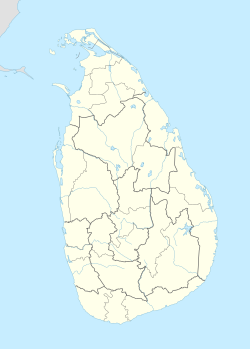
Back بالانجودا ARZ Balangoda (lungsod sa Sri Lanka) CEB Balangoda German Balangoda Spanish بالانگودا Persian Balangoda Polish Балангода Russian බලංගොඩ Singhalese Balangoda Swedish பலாங்கொடை Tamil
Balangoda
බළන්ගොඩ பலாங்கொடை | |
|---|---|
| Coordinates: 6°39′N 80°41′E / 6.650°N 80.683°E | |
| Country | Sri Lanka |
| Province | Sabaragamuwa Province |
| District | Ratnapura District |
| Time zone | +5.30 |

Balangoda is a town in Ratnapura District, Sabaragamuwa Province, Sri Lanka, governed by an urban council located 143 kilometres (89 mi) away from Colombo and 43 kilometres (27 mi) from Ratnapura on Colombo - Batticaloa Highway(A4). It is one of the largest towns of the Sabaragamuwa Province. According to the 2001 census, Balangoda has a population of 16,875 and area of 16.2 km2 (4,000 acres).
Balangoda is notable due to the discovery of skeletal Hominini remains from the late Quaternary period (the earliest reliably dated record of anatomically modern humans in South Asia).[1][2] The town is also the birthplace of Balangoda Ananda Maitreya Thero[3] and Sirimavo Bandaranaike (the world's first female head of government) the Prime Minister of Sri Lanka (1960–65, 1970–77 and 1994–2000).[4][5]
Balangoda is situated in the hilly central region of central Sri Lanka on Sabaragamuwa Mountain Range. The main livelihoods of this region are farming (vegetables, fruits, and spices), rice cultivation for mainly local consumption, tea cultivation for international markets as a commercial crop and gem mining.
- ^ Deraniyagala, Siran U. (1996). "Pre- and Protohistoric settlement in Sri Lanka". Congress of the International Union for Prehistoric and Protohistoric Sciences. 5 (16): 277–285.
- ^ Kennedy, Kenneth A. R. (2000). God-Apes and Fossil Men: Paleoanthropology of South Asia. University of Michigan Press. pp. 180–181.
- ^ Fernando, Thilak (24 September 1994). "Face to face with late Ven. Aggamaha Panditha Balangoda Ananda Maitreya Thero". The Island - Saturday Magazine. Retrieved 4 May 2010.
- ^ "Sirimavo R.D. Bandaranaike (prime minister of Sri Lanka)". BRITANNICA-Online.
- ^ "Sirimavo Bandaranaike: First woman premier". BBC News. 10 October 2000.
